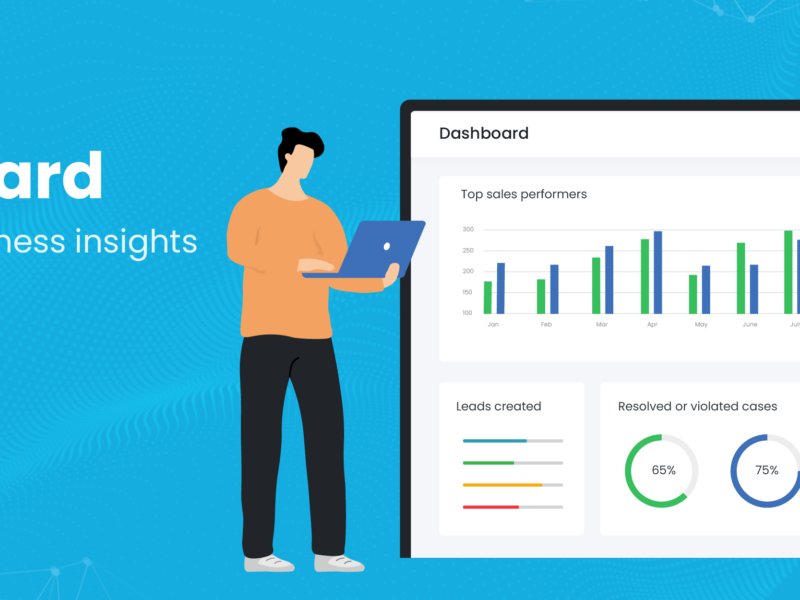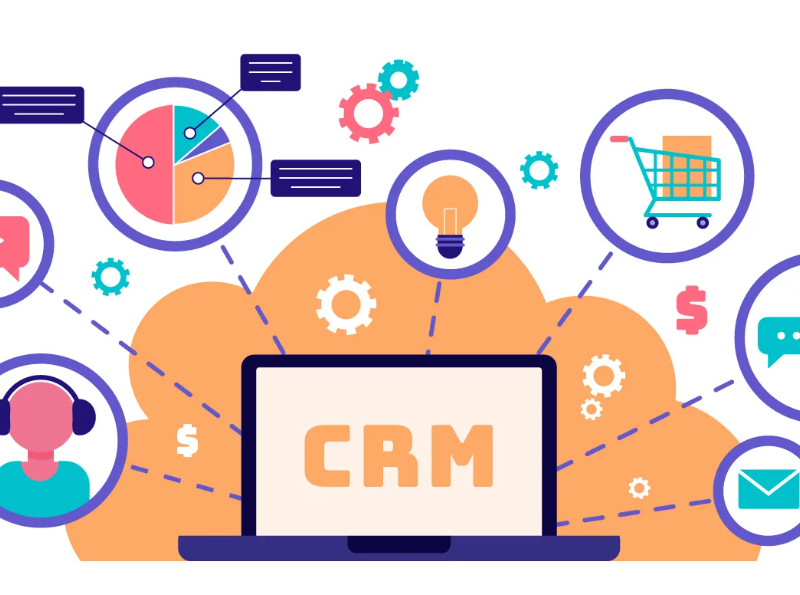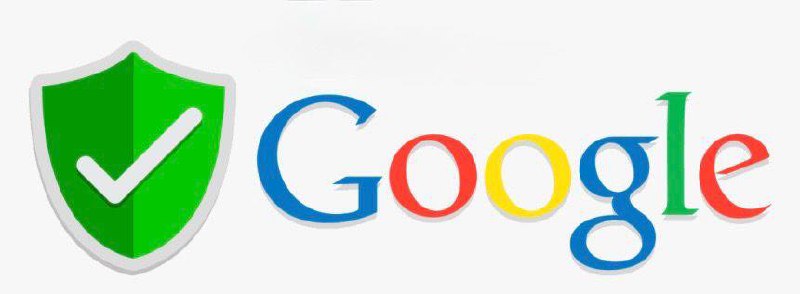In today’s digital landscape, Customer Relationship Management (CRM) systems are more than just tools for managing client interactions; they are critical components of a company’s security infrastructure.
As businesses increasingly handle sensitive customer data, the need for robust security features in CRM platforms has never been more pressing. From advanced encryption to multi-factor authentication, these features not only protect valuable information from cyber threats but also ensure compliance with regulatory standards.
This article explores the essential security measures that every CRM should incorporate to safeguard both the business and its clients.
Essential Security Features in CRM Systems
In the realm of Customer Relationship Management (CRM), security is paramount. With sensitive customer data being a critical asset, it’s essential to implement robust security measures to protect this information from unauthorized access, breaches, and other potential threats.
This ensures not only the integrity and confidentiality of the data but also maintains trust with your customers and complies with regulatory standards.
Data Encryption and Secure Storage
Data encryption is a fundamental security feature in CRM systems. It ensures that customer data is protected both in transit and at rest.
Encryption algorithms such as AES (Advanced Encryption Standard) are commonly used to scramble data, making it unreadable to unauthorized users. Secure storage practices, including the use of firewalls and secure servers, further enhance data protection by creating multiple layers of defense against potential cyber attacks.
User Access Controls and Authentication
Implementing rigorous user access controls is crucial for CRM security. This involves assigning specific roles and permissions to users, ensuring that they have access only to the data and functionalities necessary for their job functions.
Multifactor authentication (MFA) adds an extra layer of security by requiring users to provide multiple forms of verification before gaining access to the CRM system. This helps prevent unauthorized access even if passwords are compromised.
Audit Trails and Monitoring
Audit trails and monitoring are essential for detecting and responding to security incidents. Audit trails provide a detailed record of all user activities within the CRM system, including logins, data modifications, and access to sensitive information.
This allows administrators to track any suspicious activity and take prompt action if necessary. Continuous monitoring, often facilitated by security information and event management (SIEM) systems, ensures that any anomalies are detected and addressed in real-time.
| Security Feature | Description |
|---|---|
| Data Encryption | Encrypts data to protect it from unauthorized access both in transit and at rest. |
| User Access Controls | Limits user access to necessary data and functionalities to prevent unauthorized access. |
| Multifactor Authentication | Requires multiple forms of verification to enhance security. |
| Audit Trails | Keeps a detailed record of user activities for monitoring and incident response. |
| Continuous Monitoring | Facilitates real-time detection and response to security incidents. |
What are the essential features of a CRM?
A Customer Relationship Management (CRM) system is a critical tool for businesses to manage their interactions with current and potential customers. Essential features of a CRM include:
1. Contact Management: This feature allows businesses to store and manage customer contact information, such as names, email addresses, phone numbers, and physical addresses. It also tracks interactions and communications with each customer, ensuring that all relevant data is easily accessible.
2. Sales Management: CRM systems help sales teams manage leads, opportunities, and sales funnels. This includes tools for lead generation, lead nurturing, and pipeline management, which help sales teams stay organized and focused on closing deals.
3. Marketing Automation: Automation tools within a CRM can help businesses manage marketing campaigns, track campaign performance, and automate certain tasks such as email marketing and social media posting. This can significantly enhance the efficiency and effectiveness of marketing efforts.
4. Customer Service: CRM systems provide tools for managing customer service interactions, including ticket management, chat support, and call center functionality. These features help businesses provide timely and effective support to their customers.
5. Analytics and Reporting: Detailed analytics and reporting tools are essential for understanding customer behavior, sales performance, and marketing effectiveness. These insights can help businesses make data-driven decisions and improve their strategies.
6. Customization and Integration: CRM systems should be customizable to fit the specific needs of a business. They should also integrate seamlessly with other tools and systems, such as accounting software, email platforms, and e-commerce platforms.
1. Contact Management
Contact management is the backbone of any CRM system. It involves storing and organizing customer data, ensuring that all relevant information is easily accessible and up-to-date. This feature is crucial for maintaining strong relationships with customers.
- Data Entry and Synchronization: CRM systems allow for the input and synchronization of customer data from various sources, ensuring that all team members have access to the most current information.
- Segmentation and Grouping: Customers can be segmented and grouped based on various criteria such as demographics, purchase history, and behavior, enabling more targeted marketing and communication strategies.
- Interaction Tracking: CRM systems track all customer interactions, including emails, phone calls, and meetings, providing a comprehensive view of the customer journey.
2. Sales Management
Sales management features in a CRM system are designed to streamline and optimize the sales process. These tools help sales teams manage leads, opportunities, and the entire sales funnel, from initial contact to closed deals.
- Lead Management: CRM systems provide tools for capturing, qualifying, and nurturing leads, ensuring that potential customers are effectively managed and converted into sales.
- Opportunity Tracking: Sales teams can track the progress of sales opportunities, set reminders, and collaborate with team members to ensure that no opportunities fall through the cracks.
- Sales Forecasting: Accurate sales forecasting is essential for business planning. CRM systems use historical data and trends to predict future sales performance, helping businesses make informed decisions.
3. Analytics and Reporting
Analytics and reporting features are vital for gaining insights into customer behavior, sales performance, and marketing effectiveness. These tools help businesses make data-driven decisions and continuously improve their strategies.
- Customer Behavior Analysis: CRM systems provide detailed insights into customer behavior, including purchase history, website activity, and engagement with marketing campaigns.
- Sales Performance Metrics: Key performance indicators (KPIs) such as sales volume, conversion rates, and average deal size are tracked and reported, allowing businesses to assess the effectiveness of their sales efforts.
- Marketing ROI Analysis: CRM systems help businesses measure the return on investment (ROI) of their marketing campaigns, identifying which strategies are most effective and where to allocate resources.
What is CRM security?
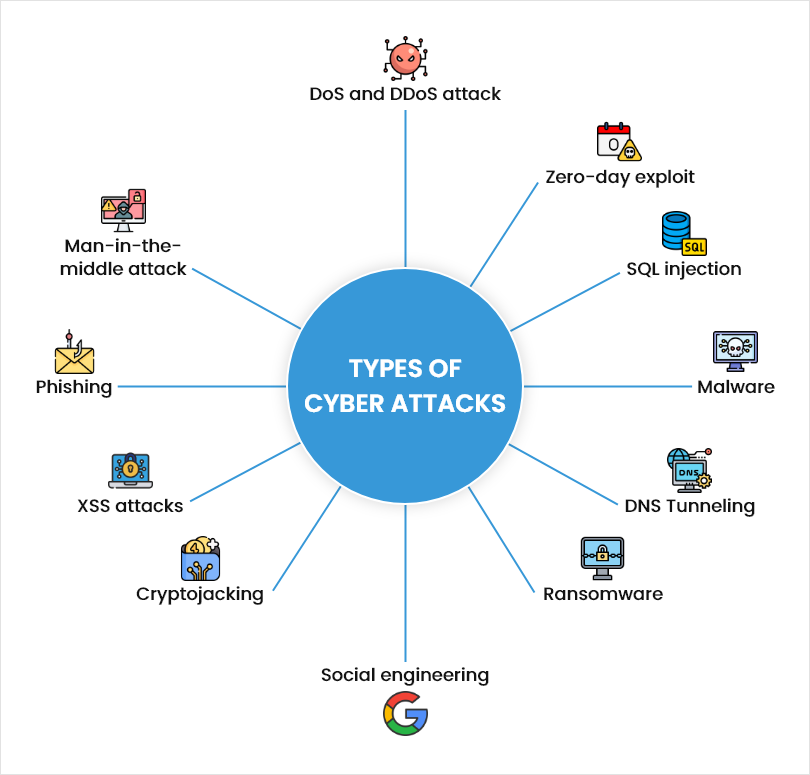
CRM security refers to the measures and practices implemented to protect data, applications, and systems within a Customer Relationship Management (CRM) environment. CRM systems store a vast amount of sensitive and valuable information, including customer data, financial records, and proprietary business processes.
Ensuring the security of this data is crucial to maintaining customer trust, complying with regulatory requirements, and safeguarding the organization’s reputation.
Types of CRM Security Measures
CRM security measures encompass a variety of strategies and technologies designed to protect CRM systems. These include:
- Access Control: Implementing role-based access control (RBAC) ensures that only authorized users have access to specific data and functionalities. This minimizes the risk of unauthorized data access and manipulation.
- Data Encryption: Encrypting data both at rest and in transit helps prevent data breaches and ensures that sensitive information remains confidential.
- Multi-Factor Authentication (MFA): Adding an extra layer of security beyond just usernames and passwords, MFA requires users to provide additional verification, such as a one-time code sent to a mobile device.
Importance of CRM Security in Business Operations
CRM security is critical for maintaining the integrity and confidentiality of business operations. Here are key reasons why:
- Customer Trust: Ensuring the security of customer data is essential for building and maintaining trust. Data breaches can severely damage a company’s reputation and lead to loss of customers.
- Regulatory Compliance: Many industries are subject to strict data protection regulations, such as GDPR, HIPAA, and CCPA. Complying with these regulations not only avoids legal penalties but also demonstrates a commitment to data security.
- Operational Efficiency: Effective CRM security measures help prevent disruptions and ensure that business operations run smoothly. Secure systems reduce the risk of downtime and data loss, which can be costly and time-consuming to recover from.
Common CRM Security Challenges and Solutions
Organizations face several challenges when securing their CRM systems. Understanding these challenges and implementing appropriate solutions is crucial. Here are some common issues and their solutions:
- Insider Threats: Employees with malicious intent or those who inadvertently expose data can pose a significant risk. Implementing strict access controls and regular security training can mitigate this risk.
- Third-Party Access: Third-party vendors and partners often require access to CRM data. Ensuring that these parties adhere to strict security protocols and conducting regular audits can help protect sensitive information.
- Phishing Attacks: Phishing remains a prevalent threat to CRM security. Educating employees about the signs of phishing attempts and using advanced email filtering tools can help prevent these attacks.
What are the 5 components of CRM?
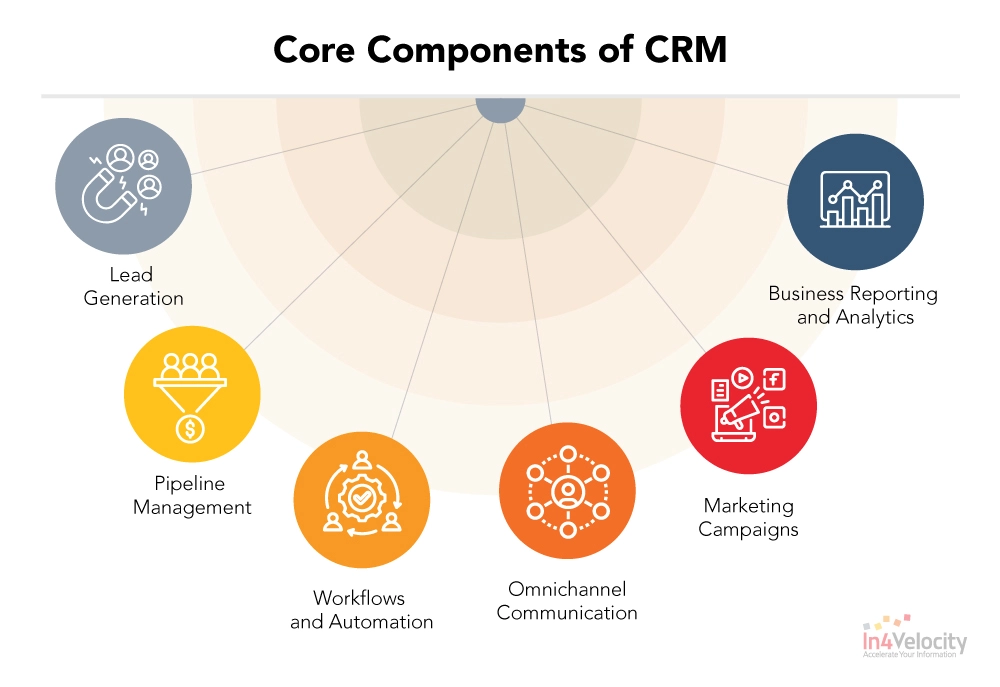
The 5 components of CRM (Customer Relationship Management) are essential elements that work together to enhance customer interactions, improve sales, and streamline business processes. These components include:
1. Sales Management: This component focuses on managing the sales pipeline, tracking leads, and closing deals. It includes tools for forecasting, performance tracking, and automating sales processes. Effective sales management helps businesses identify opportunities, prioritize efforts, and maximize revenue.
2. Marketing Management: This component deals with planning, executing, and measuring marketing campaigns. It includes tools for email marketing, social media management, and web analytics. Marketing management helps businesses target the right audience, track campaign performance, and optimize marketing strategies.
3. Customer Service and Support: This component is dedicated to providing excellent customer service and support. It includes tools for managing customer inquiries, resolving issues, and tracking customer satisfaction. Efficient customer service and support can enhance customer loyalty and reduce churn rates.
4. Customer Analytics: This component involves collecting and analyzing customer data to gain insights into customer behavior and preferences. It includes tools for data mining, customer segmentation, and predictive analytics. Customer analytics help businesses make data-driven decisions and personalize customer experiences.
5. Field Service Management: This component focuses on managing and optimizing field service operations. It includes tools for scheduling appointments, dispatching technicians, and tracking service requests. Field service management ensures that businesses can deliver timely and efficient service to their customers.
1. The Role of Sales Management in CRM
Sales management is a critical component of CRM that focuses on optimizing the sales process from lead generation to closing deals. It helps businesses:
- Identify and prioritize high-potential leads.
- Track the progress of sales opportunities through the pipeline.
- Forecast revenue and set realistic sales targets.
- Automate routine tasks to improve efficiency and reduce errors.
- Monitor sales performance and provide actionable insights to the sales team.
2. Enhancing Customer Service with CRM
Customer service and support are vital for maintaining customer satisfaction and loyalty. CRM systems enhance these efforts by:
- Providing a centralized platform for managing customer interactions and inquiries.
- Enabling real-time tracking of customer issues and resolutions.
- Offering self-service options like knowledge bases and chatbots to reduce response times.
- Generating reports to measure service performance and identify areas for improvement.
- Personalizing customer interactions to provide a more tailored experience.
3. Leveraging Customer Analytics for Better Decision-Making
Customer analytics play a crucial role in CRM by providing valuable insights into customer behavior and preferences. This component helps businesses:
- Segment customers based on demographics, purchase history, and other factors.
- Identify patterns and trends in customer data to predict future behavior.
- Measure the effectiveness of marketing and sales campaigns.
- Optimize pricing strategies based on customer demand and market conditions.
- Personalize marketing messages and offers to improve engagement and conversion rates.
Why is data security important in CRM?

Data security in CRM is crucial for several reasons, primarily because it protects sensitive customer information, maintains trust, and ensures compliance with legal regulations. In the digital age, customer data is one of the most valuable assets a business can have.
However, this data can also be a target for cybercriminals and other malicious actors. A breach in data security can lead to significant financial losses, damage to brand reputation, and legal penalties.
Moreover, secure data management is essential for maintaining customer trust, which is vital for building long-term relationships and fostering customer loyalty.
Protecting Customer Privacy and Confidentiality
Protecting customer privacy and confidentiality is a fundamental aspect of data security in CRM. Customer data often includes sensitive information such as personal details, financial records, and transaction history.
Ensuring that this data is secure helps prevent unauthorized access, which can lead to identity theft, fraud, and other serious issues. Companies must implement robust security measures, such as encryption, access controls, and regular security audits, to safeguard customer information.
- Encryption: Encrypting data both at rest and in transit ensures that even if data is intercepted, it remains unreadable.
- Access Controls: Limiting access to customer data to only authorized personnel helps prevent internal data breaches and misuse of information.
- Regular Audits: Conducting regular security audits and vulnerability assessments helps identify and mitigate potential security gaps.
Maintaining Customer Trust and Brand Reputation
Maintaining customer trust and brand reputation is another critical reason for prioritizing data security in CRM. Customers are increasingly aware of the importance of data privacy and are more likely to do business with companies that demonstrate a strong commitment to protecting their information.
A data breach can erode customer trust, leading to a loss of business and negative publicity. On the other hand, companies that prioritize data security can build a reputation for reliability and integrity, which can attract and retain customers.
- Customer Confidence: Secure data practices reassure customers that their information is safe, fostering a sense of trust and loyalty.
- Positive Publicity: Companies that proactively communicate their data security measures can gain positive media attention and enhance their brand image.
- Customer Retention: Trusted brands are more likely to retain customers and benefit from repeat business and positive word-of-mouth.
Compliance with Legal and Regulatory Requirements
Compliance with legal and regulatory requirements is a key aspect of data security in CRM. Many countries have strict data protection laws, such as the General Data Protection Regulation (GDPR) in the European Union and the California Consumer Privacy Act (CCPA) in the United States.
These regulations impose strict standards for data collection, storage, and usage, and non-compliance can result in significant fines and legal actions. By implementing strong data security measures, businesses can ensure they meet these legal obligations and avoid costly penalties.
- Regulatory Standards: Adhering to data protection laws and industry standards helps businesses avoid legal issues and fines.
- Customer Rights: Ensuring compliance with data protection regulations also means respecting and protecting the rights of customers, such as the right to access and delete their data.
- Audit Preparedness: Being prepared for regulatory audits and inspections is crucial for demonstrating compliance and maintaining a good standing with regulatory bodies.
Frequently Asked Questions
What are the essential security features every CRM should have?
Essential security features in CRM include data encryption, multi-factor authentication, role-based access control, and regular security audits. These features ensure that sensitive customer information is protected from unauthorized access and potential data breaches, maintaining trust and compliance with industry standards.
How does data encryption contribute to CRM security?
Data encryption in CRM systems converts data into a coded format that can only be accessed with a specific key. This prevents unauthorized users from reading sensitive information even if they manage to access the data, ensuring that customer data remains confidential and secure.
Why is multi-factor authentication important in CRM systems?
Multi-factor authentication (MFA) adds an extra layer of security by requiring users to provide two or more verification factors to gain access. This significantly reduces the risk of unauthorized access, even if passwords are compromised, thereby enhancing the overall security of the CRM system.
What role does role-based access control play in CRM security?
Role-based access control (RBAC) restricts access to CRM data based on user roles and responsibilities. This ensures that users only have access to the information necessary for their job functions, minimizing the risk of data exposure and misuse. RBAC helps maintain data integrity and compliance with data protection regulations.
